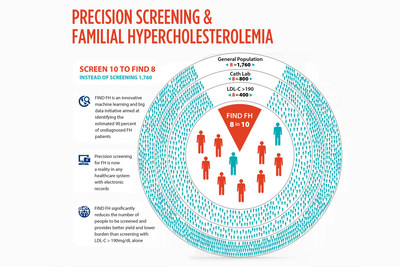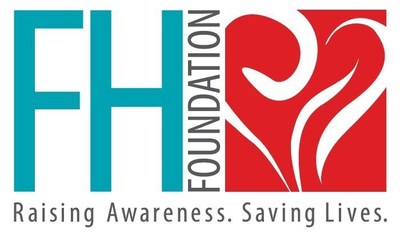The FH Foundation, a leading research and advocacy organization, announced today that a machine learning algorithm effectively identified individuals with probable familial hypercholesterolemia (FH) for the first time at a national scale through its FIND FH® initiative
|
ATLANTA, Oct. 21, 2019 /PRNewswire/ -- The FH Foundation, a leading research and advocacy organization, announced today that a machine learning algorithm effectively identified individuals with probable familial hypercholesterolemia (FH) for the first time at a national scale through its FIND FH® initiative. FH is a common genetic disorder that carries a 20-times higher risk for life-threatening cardiovascular disease, but today less than 10 percent of the 1.3 million Americans born with FH are diagnosed.i
The FH Foundation study, designed to validate and implement the FIND (Flag, Identify, Network, Deliver) FH model, was published online in The Lancet Digital Health and simultaneously presented at the 2019 FH Global Summit in Atlanta. In "Precision screening for familial hypercholesterolemia: a machine learning study applied to electronic health encounter data," the authors highlight that the FIND FH model successfully scanned large, diverse, and disparate healthcare encounter databases to flag individuals with probable FH. The FIND FH model performed comparably with high precision across two distinct types of healthcare data: a national healthcare encounter database and the Oregon Health & Science University (OHSU) electronic health records (EHR) database. Eight out of 10 times the model correctly identified FH individuals, significantly reducing the number of people needed to be screened. "Precision screening for FH is now a reality in any healthcare system with electronic health records," said Daniel J. Rader, MD, chair of the department of Genetics in the Perelman School of Medicine at the University of Pennsylvania, chief scientific advisor of the FH Foundation and study co-author. "We no longer need to screen everyone to find individuals who are at genetic risk for heart attacks and strokes. After further clinical evaluation, if an FH diagnosis is made, it will trigger screening of relatives as well. While FH is manageable, the greatest benefit is from treatment earlier in life." Today, population-based screening for FH in the U.S. has not been widely implemented, leaving families at continued risk, even though the American Heart Association, American College of Cardiology, Centers for Disease Control and Prevention and the World Health Organization recommend screening to identify families with FH. Precision screening allows a healthcare system or provider to focus on screening those individuals most at risk and more likely to benefit from early diagnosis and intervention. "People born with familial hypercholesterolemia develop cardiovascular damage by puberty, often culminating in early heart attacks or the need for surgery as young or middle-aged adults," said Katherine Wilemon, founder and CEO of the FH Foundation and study co-author. "Since diagnosis of this deadly but treatable condition has stalled in the American medical system, the FH Foundation harnessed artificial intelligence and big data to accelerate identification of those most likely to have FH." Specific study results showed the FIND FH screening algorithm correctly identified individuals with probable FH 87 percent of the time in the national database and 77 percent of the time in the Oregon Health & Science University EHR. By using clinical data such as medication use and medical history, the FIND FH model identified individuals who would be overlooked by relying just on LDL-cholesterol cut-offs (traditionally greater than 190 mg/dL) – often used for identifying people with the condition. "The FIND FH model carries the promise of efficiently identifying many of the over 1 million undiagnosed individuals with FH in the U.S.," said Kelly Myers, the FH Foundation chief technology officer and study co-author. "The FIND FH model performed equally well on data from integrated healthcare systems as well as a large national healthcare encounter database, suggesting that it will be applicable to implementation at a variety of healthcare institutions and organizations." About the FIND FH Model The FH Foundation developed the innovative FIND FH initiative to make FH screening efficient, pragmatic and high-yield. If found early, FH can be managed to greatly reduce cardiovascular disease and early death. The FIND (Flag, Identify, Network, Deliver) FH model and implementation uses machine learning and medical big data to identify individuals who warrant further evaluation by a clinician for a potential FH diagnosis. The model leverages a healthcare database that has been developed over the past six years by the FH Foundation and includes national healthcare encounter data on over 272 million individuals in the U.S. being treated or evaluated for cardiovascular disease. The initiative also includes a HIPAA-compliant outreach program targeting healthcare providers so they can receive identification of the individuals with probable FH in their practice. The FIND FH model is now being used by several healthcare systems in the U.S. to identify individuals at high risk for FH. About Familial Hypercholesterolemia (FH) FH is the most common genetic cause of early, life-threatening cardiovascular disease. FH causes high LDL-cholesterol from birth and is the cause of 20 percent of heart attacks under the age of 45.ii Undiagnosed FH costs 16 years in life expectancy if the diagnosis is not made by 18 years of age. Early and significant reduction of LDL-cholesterol is key to successful management of FH, which requires lifelong treatment. About the FH Foundation The FH Foundation is a leading non-profit research and advocacy organization focused on reducing cardiovascular disease by driving scientific understanding and evidence-based care of FH. The mission of the FH Foundation is to save lives by contributing to scientific research that leads to greater understanding and improved diagnosis and treatment of familial hypercholesterolemia worldwide. Please visit www.TheFHFoundation.org for more information. i Knowles J, et al. Reducing the burden of disease and death from familial hypercholesterolemia: A call to action. Am Heart J.2014;168:807-811.
SOURCE The FH Foundation |






